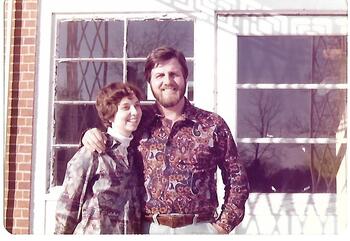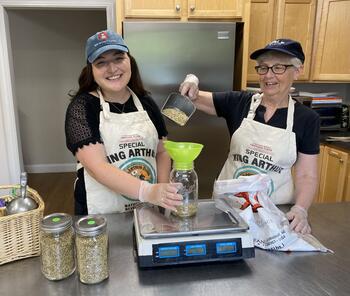By Melissa Kvidahl Reilly
Upon her retirement from full-time ministry in 2016, Janet Smith-Rushton ’78 M.Div. retreated to Waquoit Village, a serene group nestled within the city of Falmouth on Cape Cod—however she hasn’t slowed down. Placing to work the values that outlined her time as a minister, she leads the Waquoit Zero Waste Bulk Shopping for Group, a grassroots initiative that gives entry to wholesome, sustainable meals in a area missing recent and healthful choices.
Religion and formation
Smith-Rushton grew up in a household setting deeply rooted in religion. Her mother and father and grandparents—even her great-grandparents—had been instrumental in shaping her non secular life. “I can’t bear in mind a time when religion wasn’t part of my being,” she says, explaining that it was built-in into every part from bedtime tales to encounters with nature. On the similar time, Smith-Rushton’s expertise as a Woman Scout laid the groundwork for a lifelong ardour for the setting, as she delighted in studying the names of woodland crops and animals, in addition to tenting within the forest every year. “I just lately pulled up a bit order of worship we created throughout a tenting journey utilizing an outdated typewriter,” she recollects with amusement. “Apparently, I used to be the minister at simply 10 years outdated.”
She initially pursued a profession in training, incomes a bachelor’s diploma at Northeastern College, however she quickly determined to change course. “I took a Christian training class at Andover Newton Theological College, and I used to be instantly hooked,” she says. “I knew at that time that I used to be referred to as into ordained ministry with a specialty in training and that I might attend seminary.”
Motion gadgets
Dwelling within the Divinity College’s married scholar housing, Smith-Rushton encountered a small international village of attention-grabbing individuals who all appeared to have two issues in frequent: skinny sources and considerable creativity.
 College students created their very own leisure, together with a bluegrass group that carried out within the Fatted Calf in addition to a males’s baking competitors that operated out of Curtis Corridor. “Bakers ready totally different recipes, and households would collect to savor the aroma and pattern the freshly baked bread,” Smith-Rushton recollects, including that sustainable residing was “baked” into nearly every part at the moment, from the meals to the furnishings. “One time, a bunch of buddies lugged the heaviest and ugliest couch from a group that was languishing within the basement and destined for the landfill,” she says. “After stripping away the upholstery and stuffing, and armed with a imaginative and prescient for the doable, a stitching machine, cloth, and new stuffing, they created an exquisite piece of furnishings for his or her lounge.”
College students created their very own leisure, together with a bluegrass group that carried out within the Fatted Calf in addition to a males’s baking competitors that operated out of Curtis Corridor. “Bakers ready totally different recipes, and households would collect to savor the aroma and pattern the freshly baked bread,” Smith-Rushton recollects, including that sustainable residing was “baked” into nearly every part at the moment, from the meals to the furnishings. “One time, a bunch of buddies lugged the heaviest and ugliest couch from a group that was languishing within the basement and destined for the landfill,” she says. “After stripping away the upholstery and stuffing, and armed with a imaginative and prescient for the doable, a stitching machine, cloth, and new stuffing, they created an exquisite piece of furnishings for his or her lounge.”
This mixed expertise of campus residing, spirituality, ministry, and sustainability will probably be instantiated on the YDS campus when the brand new Dwelling Village residences open in 2025. “I hope this can encourage college students to reside flippantly on the earth,” Smith-Rushton says. (The Yale Membership of Cape Cod will host Dean Greg Sterling for a presentation on the undertaking in Falmouth, Mass., on July 13.)
In 1976, Smith-Rushton was ordained as a United Methodist minister. Her subsequent ministry profession would span 4 a long time and take her throughout Massachusetts and New Hampshire.
Throughout her first appointment as affiliate pastor, she was launched to farmers markets and joined a grassroots meals co-op working from a neighbor’s house. Impressed by these experiences, she initiated her personal food-co-op throughout her subsequent appointment, marking the start of a lifelong involvement within the native and sustainable meals motion. Wherever she went, she infused this ardour into her ministry, whether or not it was beginning a group backyard or facilitating church work on group supported agriculture (CSA) packages. “Once I was ordained, our bishops had been clear that we had been appointed to serve the church and the group,” she says. “So, whereas the precise actions relied on the wants of the group and assorted from church to church, I used to be at all times concerned in one thing sustainable.”
When Smith-Rushton retired in 2016, she and her husband moved to Waquoit. “This space is one thing of a meals desert in that we don’t have quite a lot of farms and recent produce close by,” she explains. The city’s solely pure meals retailer had just lately closed, and Falmouth lacked a retailer that bought bulk gadgets and allowed patrons to reuse their very own containers to attenuate waste. “I used to be volunteering at a CSA farm, and I noticed that proper right here was this supply of actually good meals,” she says. “Over time, I started to imaginative and prescient with one of many farmers about filling a necessity for a bulk group.”
Armed with a mission to cut back waste and promote aware consumption, Smith-Rushton and a devoted group of volunteers partnered with native farmers and distributors to launch the Waquoit Zero Waste Bulk Shopping for Group (W.0.W.) in 2019. Not solely would this initiative present the group with high-quality, entire, natural, and wholesome meals at bulk or wholesale costs, however it will cut back packaging waste, help native and regional farmers, cut back Waquoit’s carbon footprint, construct a way of group via shared meals and work, and redirect meals {dollars} from giant grocery chains.
W.0.W. began with about 10 members buying fundamental pantry gadgets like sugar, beans, nuts, and flour. No matter was left after they break up the bounty was packaged for the church’s bulk pantry shelf (out there to anybody locally) or bought on the farmer’s market. “This acquainted the general public with the idea—individuals would say it reminded them of their grandma’s pantry,” Smith-Rushton says. “That outreach was important as a result of it was how we grew our membership and discovered about what sorts of meals our group was most considering.”
Within the 5 years since its inception, the group has grown to about 30 members. By utilizing compostable brown paper baggage and refillable glass jars, they’ve bought and distributed over 3,000 kilos of meals with out including trash or recycling to the native waste stream. And, they’ve diverted practically $135,000 from the earnings of enormous, multinational companies and redirected them to small, native companies and producers. W.0.W.’s choices have additionally grown to incorporate rice, quinoa, oats, pasta, nuts, fruit, beans, butter, grass fed natural beef, poultry, milk, eggs, and greens; every month’s order is totally different relying on the members’ wants.
A type of ministry
 Past providing the financial and environmental advantages of bulk shopping for, W.0.W. serves as a hub for the group and a spot for connection in unsettling occasions. Throughout the challenges of the COVID-19 pandemic, when entry to meals turned a urgent concern for a lot of, the group remained steadfast, offering a lifeline for households in want and fostering a way of solidarity. “What makes this group so fantastic is that it’s designed to serve each the religion group and the broader Falmouth group,” says Smith-Rushton. “Our members come from all walks of life and are fantastic individuals doing attention-grabbing issues.”
Past providing the financial and environmental advantages of bulk shopping for, W.0.W. serves as a hub for the group and a spot for connection in unsettling occasions. Throughout the challenges of the COVID-19 pandemic, when entry to meals turned a urgent concern for a lot of, the group remained steadfast, offering a lifeline for households in want and fostering a way of solidarity. “What makes this group so fantastic is that it’s designed to serve each the religion group and the broader Falmouth group,” says Smith-Rushton. “Our members come from all walks of life and are fantastic individuals doing attention-grabbing issues.”
Although formally retired, Smith-Rushton sees this undertaking as an extension of her ministry—a platform to deepen her engagement with the group and advance her dedication to service. “Now that I’m retired from full-time ordained ministry, I’ve the liberty to be extra absolutely engaged locally and be a listening presence, to essentially stroll with individuals of their journey and be current with individuals the place they’re,” she says. “Many individuals usually are not comfy in an institutional church, but lead very deep non secular lives, have connections to the creator, and have an appreciation for the setting and nature. To have the ability to share this ardour with individuals has been a present I’ve loved immensely.”
Melissa Kvidahl Reilly is a New Jersey-based author and editor who makes a speciality of greater and spiritual training in addition to business-to-business topics.






























































